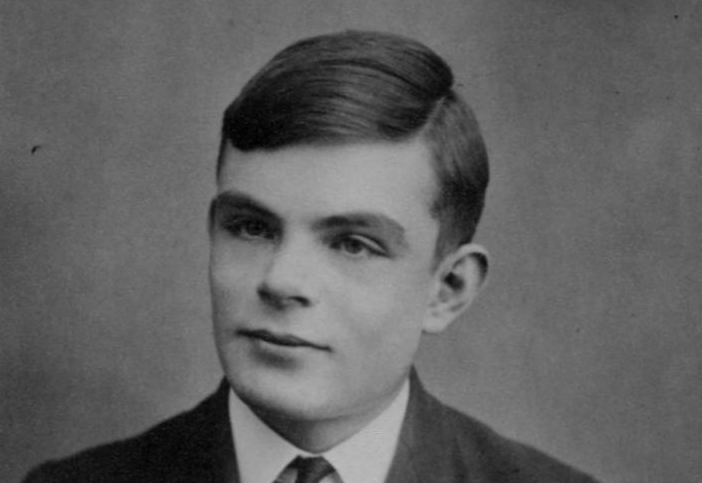
Image via Wikimedia Commons
We now regard Alan Turing, the troubled and ultimately persecuted cryptanalyst (and, intellectually, much more besides)—who cracked the code of the German Enigma machine in World War II—as one of the great minds of history. His life and work have drawn a good deal of serious examination since his early death in 1954, and recently his legacy has even given rise to popular portrayals such as that by Benedict Cumberbatch in the film The Imitation Game. So what, more and more of us have started to wonder, forms a mind like Turing’s in the first place?
A few years ago, mathematics writer Alex Bellos received, from “an old friend who teaches at Sherborne, the school Turing attended between 1928 and 1930,” some “new information about the computer pioneer and codebreaker’s school years” in the form of “the list of books Turing took out from the school library while he was a pupil.” Bellos lists them as follows:
- Illusions
- Journal of the Chemical Society, vols. 95, 96, 97
- Lead
- Modern Electric Theory
- Money
- Isotopes by Frederick William Aston
- Mathematical Recreations and Essays by W. W. Rouse Ball
- Alice’s Adventures in Wonderland, Game of Logic and Through The Looking Glass by Lewis Carroll.
- The Common Sense of the Exact Sciences by William Kingdon Clifford
- Space, Time and Gravitation and The Nature of the Physical World by Sir Arthur Stanley Eddington.
- Sidelights on Relativity by Albert Einstein
- The Escaping Club by A. J. Evans
- Contributions to Mental Philosophy by Immanuel Hermann Fichte, translated and edited by J.D. Morell
- The New Physics by Arthur Haas
- Supply and Demand by Hubert D. Henderson
- The Stars in their Courses by Sir James Hopwood Jeans
- Atoms and Rays and Phases of Modern Science by Sir Oliver Lodge.
- Matter and Motion by James Clerk Maxwell
- The Theory of Heat by Thomas Preston
- A Selection of Photographs of Stars, Star-Clusters & Nebulae, together with information concerning the instruments & the methods employed in the pursuit of celestial photography by Isaac Roberts
- Modern Chromatics, with applications to art and industry by Ogden Nicholas Rood
- Celestial Objects for Common Telescopes by Thomas William Webb
- The Recent Development of Physical Science by William Cecil Dampier Whetham
- Science and The Modern World by Alfred North Whitehead
- Sound Waves and their Uses by Alexander Wood
“As you can see, and as you might expect,” writes Bellos, “heavy on the sciences. The AJ Evans, a memoir about the author’s escape from imprisonment in the First World War, is the only non-scientific book.” He also notes that “the physics books he took out all look very serious, but the maths ones are lighthearted: the Lewis Carroll and the Rouse Ball, which for decades was the classic text in recreational maths problems.” Sherborne archivist Rachel Hassall, who provided Bellos with the list, also told him that “the book chosen by Turing for his school prize was a copy of the Rouse Ball. Even teenage geniuses like to have fun.”
If you, too, would like to do a bit of the reading of a genius — or, depending on how quantitatively your own mind works, just have some fun — you can download for free most of these books the young Turing checked out of the school library. Programmer and writer John Graham-Cumming originally found and organized all the links to the texts on his blog; you can follow them there or from the list in this post. And if you know any youngsters in whom you see the potential to achieve history’s next Turing-level accomplishment, send a few e‑books their way. Why read Harry Potter, after all, when you can read A Selection of Photographs of Stars, Star-Clusters & Nebulae, together with information concerning the instruments & the methods employed in the pursuit of celestial photography?
Related Content:
The Enigma Machine: How Alan Turing Helped Break the Unbreakable Nazi Code
Based in Seoul, Colin Marshall writes and broadcasts on cities, language, and style. He’s at work on a book about Los Angeles, A Los Angeles Primer, the video series The City in Cinema, the crowdfunded journalism project Where Is the City of the Future?, and the Los Angeles Review of Books’ Korea Blog. Follow him on Twitter at @colinmarshall or on Facebook.


Leave a Reply